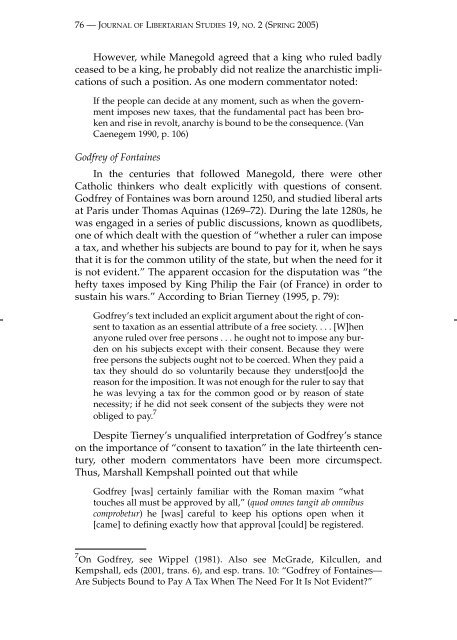Quod Omnes Tangit
Quod Omnes Tangit
Quod Omnes Tangit
You also want an ePaper? Increase the reach of your titles
YUMPU automatically turns print PDFs into web optimized ePapers that Google loves.
76 — JOURNAL OF LIBERTARIAN STUDIES 19, NO. 2 (SPRING 2005)<br />
However, while Manegold agreed that a king who ruled badly<br />
ceased to be a king, he probably did not realize the anarchistic implications<br />
of such a position. As one modern commentator noted:<br />
If the people can decide at any moment, such as when the government<br />
imposes new taxes, that the fundamental pact has been broken<br />
and rise in revolt, anarchy is bound to be the consequence. (Van<br />
Caenegem 1990, p. 106)<br />
Godfrey of Fontaines<br />
In the centuries that followed Manegold, there were other<br />
Catholic thinkers who dealt explicitly with questions of consent.<br />
Godfrey of Fontaines was born around 1250, and studied liberal arts<br />
at Paris under Thomas Aquinas (1269–72). During the late 1280s, he<br />
was engaged in a series of public discussions, known as quodlibets,<br />
one of which dealt with the question of “whether a ruler can impose<br />
a tax, and whether his subjects are bound to pay for it, when he says<br />
that it is for the common utility of the state, but when the need for it<br />
is not evident.” The apparent occasion for the disputation was “the<br />
hefty taxes imposed by King Philip the Fair (of France) in order to<br />
sustain his wars.” According to Brian Tierney (1995, p. 79):<br />
Godfrey’s text included an explicit argument about the right of consent<br />
to taxation as an essential attribute of a free society. . . . [W]hen<br />
anyone ruled over free persons . . . he ought not to impose any burden<br />
on his subjects except with their consent. Because they were<br />
free persons the subjects ought not to be coerced. When they paid a<br />
tax they should do so voluntarily because they underst[oo]d the<br />
reason for the imposition. It was not enough for the ruler to say that<br />
he was levying a tax for the common good or by reason of state<br />
necessity; if he did not seek consent of the subjects they were not<br />
obliged to pay. 7<br />
Despite Tierney’s unqualified interpretation of Godfrey’s stance<br />
on the importance of “consent to taxation” in the late thirteenth century,<br />
other modern commentators have been more circumspect.<br />
Thus, Marshall Kempshall pointed out that while<br />
Godfrey [was] certainly familiar with the Roman maxim “what<br />
touches all must be approved by all,” (quod omnes tangit ab omnibus<br />
comprobetur) he [was] careful to keep his options open when it<br />
[came] to defining exactly how that approval [could] be registered.<br />
7 On Godfrey, see Wippel (1981). Also see McGrade, Kilcullen, and<br />
Kempshall, eds (2001, trans. 6), and esp. trans. 10: “Godfrey of Fontaines—<br />
Are Subjects Bound to Pay A Tax When The Need For It Is Not Evident?”
















